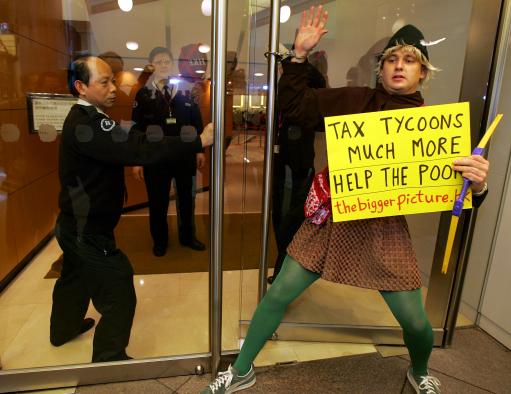That Robin Hood Tax Thing – Well, Who Pays The Extra?
 WE’VE all seen that lovely video where Bill Nighy can’t work out why there shouldn’t be this Robin Hood Tax thing. Tiny amounts, 0.1%, sliced off every bank transaction to fund all sorts of lovely things. There’s been some argument in technical circles about this of course and the split’s along the usual lines.
WE’VE all seen that lovely video where Bill Nighy can’t work out why there shouldn’t be this Robin Hood Tax thing. Tiny amounts, 0.1%, sliced off every bank transaction to fund all sorts of lovely things. There’s been some argument in technical circles about this of course and the split’s along the usual lines.
Those who know what they’re talking about, you know, Nobel Laureates and the like, think it’s a very bad idea, those who would just to have more money to spend, you know, like politicians, think it’s a great idea. And so we come to the European Union which has just proposed exactly such a tax, a financial transactions tax, and FTT. As Sr. Barroso says:
He added: “It is a question of fairness. If our farmers, if our workers, if all the sectors of the economy from industry to agriculture to services, if they all pay a contribution to the society, also the banking sector should make a contribution to the society.”
Which is lovely: although do note that farmers pay tax on their profits, workers on their wages and banks pay tax on their profits and bankers on their wages so they are already making that same contribution. The big question is, who pays this extra tax? In technical terms, where is the economic incidence of the FTT?
No, it’s not the banks. Here is the IMF telling us:
How much overall investment would fall as a result of the STT would depend on the relative
elasticities of capital supply and demand. In a small, open economy, the after-tax return on
capital is determined on the world market. In response to imposition of the STT, capital
would flow out until its after-tax return was restored to the world market level. In the long
run, capital owners would therefore not bear the burden of the STT; it would fall on workers,who as a result of the smaller capital stock would be less productive and receive lower
wages. If, however, the capital supply is less than perfectly elastic, the STT will lower the
return on capital, and capital owners will share the burden of the tax with workers.
So, the incidence is either on your pension or your paycheque. But it is on you: not the banks. For another view, one arrived at 15 years ago so not infected with any of the debate about Robin Hood etc, this from the Canadian Government:
Furthermore, the distributional impact of an FTT might not be as desirable as expected. It is true that wealth holdings rise more than proportionately with income. But institutional investors are becoming increasingly important players in financial markets, and their clientele is much more broadly representative of Canadian society. More importantly, however, if the introduction of a tax caused asset prices to fall, the retired and near retired would suffer a disproportionately large impact, even though most are not rich. Pension funds, even passively managed ones, might find it difficult to meet their commitments in such circumstances.
The unintended side effects of an FTT would not stop there, however. Such a tax could reduce the efficiency of capital markets if it created inertia amongst investors. If investors did not react to new information, the prices of securities would not reflect true economic value and financial resources would not be allocated efficiently. This would raise the cost of capital and hence reduce the amount of capital formation. The long-run consequences would be a reduction in productivity and hence real wages.
Your pension fund or your paycheque again.
It’s a lovely idea, that we can tax those bad people over there and get lots of money to spend on good things. The FTT though does not tax the banks, it taxes us: still think it’s such a good thing?
Posted: 29th, September 2011 | In: Key Posts, Money Comment | TrackBack | Permalink


